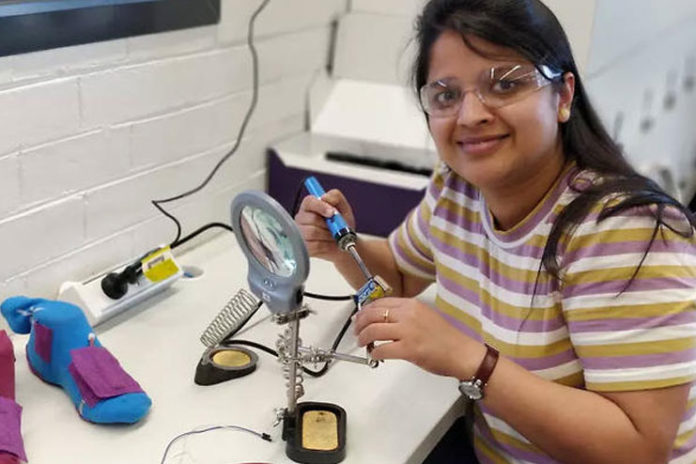An Indian-origin research from University of Melbourne’s School of Engineering, invented a ‘smart socks’ that renders physiotherapists real-time information on a patient’s lower body movements, by merely having the patient wear a pair of socks.
In the counties like India and Australia, as decent medical facilities are fewer, 30-year-old Deepika Aggrawal’s smart socks invention will be a boon for particularly in far-flung rural regions.
These smart socks, known as SoPhy are wearable technology that passage to the physiotherapist information regarding the subtle fluctuations in patient’s movements, such as alterations in weight distribution and the range of foot movements.
The PhD student asserts that she acquired an idea to contrive smart socks when her father, who lives in northern town in India could not move to some other city for aid.
“My hometown Deoband in Uttar Pradesh lacks good medical facilities. When my dad suffered a broken ankle, he was unable to travel for face-to-face consultations,” Deepika said.
She added, “Physiotherapy requires a patient with chronic pain to have a series of consultations. For those who live in remote areas, making frequent visits to the city is not easy. They rely heavily on video consultation, but it’s not delivering results or effective treatment.”
It took Aggrawal eight months of duration to invent pair of battery-run socks, which have four pressure detectors hidden in them. The socks are connected the web interface which is accessed by the physiotherapist from their point. They cost $300 to bring forth.
Testing was done on three of the hospital’s pediatric patients experiencing chronic pain. “It was a successful trial. The doctors have started to feel more confident with video consultation mainly because of the precise information they are getting,” Aggrawal said.
The hospital has also stated curiosity in extending the project.
If everything goes as per predetermined, Aggrawal hopes to broaden the utility of SoPhy to other regions, peculiarly for pregnant women who can’t travel on a regular basis for personal appointments.
By Sowmya Sangam














































